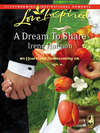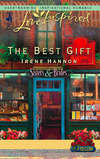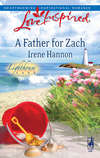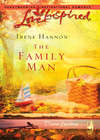Kitabı oku: «A Family to Call Her Own»
As Rebecca drove carefully through the swirling fog, she stole a glance at her unconscious and unexpected passenger….
Although his color was ashen, his clothes stained and rumpled, she could tell that he was handsome in a rugged sort of way. His strong profile and jaw seemed to speak of character and integrity. Yet there was a worn look about his face—a sort of deep weariness that had nothing to do with his injuries. For some reason Rebecca had the impression that he was a man who had seen it all and now viewed the world with cynicism.
Rebecca’s gaze snapped back to the road. She was letting herself get way too fanciful. Looks could be deceiving. She knew that from experience. In a few minutes she’d leave him at the hospital and probably never see this man again.
But oddly enough, the thought didn’t give her much comfort….
IRENE HANNON
is an award-winning author who has been a writer for as long as she can remember. She “officially” launched her career at the age of ten, when she was one of the winners in a “complete-the-story” contest conducted by a national children’s magazine. More recently, Irene won the coveted RITA® Award for her 2002 Love Inspired book, Never Say Goodbye. Irene, who spent many years in an executive corporate communications position with a Fortune 500 company, now devotes herself full-time to her writing career. In her “spare” time, she enjoys performing in community musical theater productions, singing in the church choir, gardening, cooking and spending time with family and friends. She and her husband, Tom—whom she describes as “my own romantic hero”—make their home in Missouri.
A Family To Call Her Own
Irene Hannon
Anyone who welcomes one little child like this in my name welcomes me.
—Matthew 18:5
To Dorothy Hannon,
my wonderful mother and cherished friend, who gave me Isabel.
Contents
Chapter One
Chapter Two
Chapter Three
Chapter Four
Chapter Five
Chapter Six
Chapter Seven
Chapter Eight
Chapter Nine
Chapter Ten
Chapter Eleven
Chapter Twelve
Chapter Thirteen
Epilogue
Letter to Reader
Chapter One
“That’s a lie!” Zach Wright shot to his feet and glared at the managing editor, bristling with rage. He leaned on the desk that separated them, palms flat, eyes flashing. “That’s a lie!” he repeated furiously.
“I’m sure it is,” Ted Larsen replied calmly, not at all intimidated by Zach’s threatening posture. “But are you willing to reveal your sources to prove it isn’t?”
“You know I can’t do that!”
Ted shrugged. “Then we’ve got to play it their way. For now.”
“Why?” Zach demanded hotly. “I’m telling you, this information is solid. I wouldn’t use it if it wasn’t.”
“I know that,” Ted conceded. “But Simmons is getting pressure on this—big-time. They’re threatening to sue.”
“It’s just a scare tactic,” Zach retorted scornfully, waving the excuse aside dismissively with an impatient gesture. “My information is good.”
“You’re probably right about the scare tactic. But it worked. For the moment, anyway. It’s not easy being a lucrative publisher in this day and age, Zach. You know that. Simmons is just being cautious.”
Zach gave a snort of disgust. “I can think of a better word for it.”
“Look, we’ll work this out. I know your information isn’t falsified. We just have to prove it.” Ted paused, as if carefully weighing his next words, anticipating the reaction. “And until we do, we’re going to kill the series.”
With a muttered oath, Zach turned away in frustration, jamming his hands into his pockets as he strode over to the window and stared out at the city streets. St. Louis could be a beautiful city, he thought. But on this dreary February day it was just plain ugly—the same as his mood. This whole experience was leaving a decidedly bad taste in his mouth. “Whatever happened to printing the truth?” he asked bitterly. “I thought that was our job.”
“It is,” Ted acknowledged. “But Simmons’s job is to keep the paper solvent. He’s not willing to risk a lawsuit.”
“So we just let them get away with it?” He turned back to face the editor, his eyes still blazing. “Ted, the corruption in that office is rampant—misuse of public funds, a rigged bidding process based on nepotism instead of price, blatant bribery—what am I supposed to do, forget about it?”
“No. Just lie low for a while. In fact, why don’t you take some time off? How many weeks have you accumulated, anyway? Five, six?”
“Eight.”
“When was the last time you took a real vacation?”
Zach shook his head impatiently. “I don’t know.”
“Maybe you’re due.”
“I don’t want to take a vacation!” Zach snapped. “I’m not running away from this story, Ted! I’ll stand behind my coverage even if the paper won’t!”
“We’re not asking you to run away,” Ted replied evenly. “Just give it a little time. If you don’t want to take some time off, we can assign you to another story while we straighten out this mess.”
“Like what?”
Ted pulled a file toward him. “Looks like the St. Genevieve area is going to get hit with another flood. I need somebody down there to cover it.”
Zach stared at the editor as if he’d gone crazy. “You’re kidding, right?”
Ted adjusted his glasses and looked across the desk at the younger man, the sudden glint of steel in his eyes making Zach wary. Ted had come up through the ranks, done a stint as an investigative reporter himself before taking over the editor job, and his staff respected his skill and integrity. But they also knew that his usual affable, easygoing manner was quite deceptive. He could be unrelenting and as tough as nails when he had to be. And now, as he fixed his razor-sharp eyes on Zach, it was clear that the conversation was over.
“No, Zach, I’m not,” he said, his tone edged with iron.
“You’re overreacting to this situation, whether you realize it or not. You need some time to decompress. Nobody can maintain the intensity, keep up the pace you set, month after month, year after year, without wearing down. You need a change of scene, a different focus, a fresh perspective. You can do that by taking the flood coverage assignment—or by taking a vacation. It’s your choice. But those are the only options.”
Zach frowned and took one hand off the wheel to flip on the overhead light, then glanced down at the map lying on the seat next to him. His city beat rarely took him more than a few miles south of town, and this part of the state was totally unfamiliar to him. St. Genevieve must be the next exit, he decided, though it was hard to tell in the dense fog that had reduced visibility to practically zero and obscured most of the highway signs.
Zach tugged at the knot of silk constricting his throat and drew in a relieved breath as the fabric gave way slightly. He didn’t like ties. Never had. But dinner with the publisher was definitely a “tie” occasion. Even though dinner had ended late, he’d wanted to get settled in and start his interviews for the flood piece first thing in the morning.
At least Simmons had had the guts to discuss the situation with him face-to-face, he thought grudgingly. The publisher had assured him that the paper stood behind him, that they had confidence in his reporting. But they’d still pulled the series. And as far as Zach was concerned, actions spoke louder than words.
Zach flexed the muscles in his shoulders and glanced at his watch. Ten o’clock. It had been a long day, he thought. A very long day. And the only good moment had been Ted’s parting words.
“These setbacks happen to all of us, Zach,” he said, laying a hand on the younger man’s shoulder. “Don’t let it get you down. You’re a good reporter. One of the best. We’ll work this out.”
Ted’s compliments were rare, and therefore prized. It had been a satisfying moment for Zach. Maybe the most satisfying in his career for a long time, he realized with sudden insight.
Zach frowned. Maybe he’d just stumbled on the source of the discontent, the restlessness that had plagued him for the last few months. His satisfaction used to come from his work, the feeling that it was making a difference. And that’s where it should come from. Not from recognition by his boss. Yet Ted’s compliment had given him more satisfaction than any of the work he’d done for the past six months.
Zach remembered his early years as a reporter, when he’d fervently believed that he could make a difference, that his writing could right wrongs and make the world a better place. For the first time in his career he seriously questioned that belief, directly confronting the doubts that he now realized had been growing for quite some time. For fifteen years he’d devoted himself single-mindedly to his work—an insatiable, demanding mistress that took all the passion he had to give. And what did he have to show for his zeal and dedication? A few moments of satisfaction when justice had prevailed. But far more moments of frustration when some scumball short-circuited the system through power, money or influence and walked away, laughing in his face.
And he certainly didn’t have financial security. His meager savings were eloquent confirmation of journalism’s reputation as a notoriously low-paying profession. He had no home, unless you could bestow that generous title on the sparsely furnished one-bedroom apartment he’d lived in for years. And he had no personal life.
All he had at the moment was a depressing feeling of emptiness.
As his precise, analytical mind clicked into gear, Zach tried to pinpoint exactly when his passion for tilting at windmills began to ebb. It might have been three years ago, he thought, when his story on corruption in the building industry blew up in his face thanks to a well-crafted smear campaign that didn’t quite discredit him but hurt his credibility enough so that no one took his coverage seriously. Or maybe it was the story he did on teenage prostitution last year, when he spent too many depressing nights on the streets with kids who should have been at pep rallies or studying for algebra exams, not hawking their bodies.
But it didn’t really matter when he’d stopped believing that what he did made a difference. The fact was he had. Maybe it was burnout, as Ted had hinted. Maybe he did need a break. It might not be a bad idea, after all, to take some time off when this assignment was completed.
But why had he burned out? Not everyone did. Josef certainly hadn’t. Zach shook his head as he thought of his idealistic journalism school classmate, back home now in Eastern Europe, fighting the good fight, as he called it, trying to make his country safe for freedom. Josef’s vision had never faltered, even in the face of setbacks and personal danger, and Zach admired him for that. He wished he had more of Josef’s conviction and optimism. But he didn’t. Not anymore. He’d seen too much and given too much. The well was dry.
Zach thought back to the last time he’d seen Josef. It had been almost eight years since his friend brought his delicate wife, Katrina, to St. Louis for the birth of their daughter. During their six-week stay with Zach, the two men had spent hours talking, debating, sharing. It had been an energizing, invigorating, renewing experience for Zach. Josef, with his serious nature, deep convictions and passionate feelings had always been an inspiration.
Zach recalled one of their last conversations, when he’d asked Josef how he coped with discouragement.
“But, Zachary, I don’t get discouraged,” his friend replied, clearly taken aback by the question.
Zach looked at him skeptically. “How can you not? Are conditions any better in your country now than when you started? Have you seen any progress?”
“I have not seen much visible evidence of progress, no,” Josef admitted. “But we are making inroads,” he stated with conviction.
“How do you know?” Zach persisted.
“Faith,” Josef replied simply. “In your country, you expect things to get better like this,” he said, snapping his fingers.
“Patience is not a virtue in America. But in my country, we are used to waiting.”
“But for how long?” Zach asked.
Josef shrugged. “Change is slow. But more and more people are on our side, Zachary, and one day there will be freedom for all. Maybe not in my lifetime. But still, I must do my part. Because, my friend, I believe that everything we do does make a difference. It is just that sometimes we do not see the result right away. But no good work is ever lost.”
For a long time after Josef and Katrina returned home, Zach recalled that conversation whenever he became discouraged. It always inspired him. But not tonight. Josef was wrong, Zach thought tiredly, lifting his hand from the wheel long enough to wearily massage his forehead. All his years of personal sacrifice while questing for truth and right hadn’t made one bit of difference in the human condition. If anything, crime was worse now than it had been when he was an eager cub reporter, determined to change the world. And that acknowledgment left a bitter taste in his mouth.
Would he feel any different if there had been someone to share his life with, to buoy him up on bad days? he wondered. But his passion had always been directed to his writing, leaving little for anything—or anyone—else. The few relationships he’d indulged in had been brief and sporadic. Either he broke them off when he realized the woman was getting serious, or she did when she realized he wasn’t.
As a result there was no one who cared if he ate dinner when he came home late—or even if he came home at all. His family in Kansas City was too far away to keep tabs on his daily life, and his only regular companion for the past ten years—a cat—eventually had her fill of his bizarre hours and crazy schedule. One night she went out and never came back.
But Josef had found time for love, despite the demands of his work and his precarious existence, Zach admitted. Political conditions were extremely unsettled in his country, and from what Josef said, they were becoming more volatile each day. But he was a man of deep faith, who truly put his trust in the Lord and was at peace with his destiny. With his faith as a foundation, he had the courage to create a family in the midst of chaos, to share his life with the people he loved. While Zach had always looked upon a family as a distraction, Josef looked upon it as an anchor, a source of strength.
And maybe that’s why he hadn’t burned out, why he still had the energy to carry on the fight for his principles, Zach speculated. His family sustained him, and in the atmosphere of love and goodness and faith that pervaded his home, Josef found strength and hope and inspiration. Maybe the lack of those support mechanisms in his own life was the reason Zach now felt so emotionally and spiritually depleted.
In a way he envied Josef’s deep faith. Living with the seedy side of life for so long had shaken Zach’s belief in a loving, caring God. Yet without that foundation of faith, he felt oddly adrift. And as for a wife and family—it wasn’t that Zach never wanted those things. It was just that he always told himself there would be plenty of time later. But at thirty-seven, “later” was now, he suddenly realized.
A sign for St. Genevieve loomed out of the mist to his right, abruptly interrupting his reverie, and Zach slowed down. This pea soup would do San Francisco proud, he thought grimly, as he cautiously made his way down the ramp and carefully turned left at the bottom.
As he drove along the two-lane road, visibility was so limited that he actually began to feel somewhat disoriented. It was almost like something in one of those old “Twilight Zone” episodes, he thought. He had the weird sensation that he was the last living thing on earth.
Zach’s gaze momentarily flickered to the rearview mirror, confirming the absence of other cars or signs of life. While he might not be alone in the world, he certainly was alone on the ghostly road.
But not quite as alone as he’d thought, he realized, when his gaze returned once more to the pavement in front of him. A deer suddenly materialized from the mist and, startled by the headlights, bolted directly in his path. With a muttered exclamation, Zach instinctively jerked the wheel sharply.
The deer bounded off safely, but Zach wasn’t so lucky.
As his lightweight, compact car fish-tailed across the unforgiving fog-slicked asphalt, Zach struggled vainly for control. But the vehicle seemed to have a mind of its own, skidding crazily toward the shoulder. His last thought as the car careened off the edge of the road and plunged down an embankment was that he’d forgotten to buckle his seat belt.
Rebecca Matthews stifled a yawn and reached for the cup of coffee in the holder under the dashboard. She grimaced as the cold liquid sluiced down her throat, but she needed the caffeine. It had been a long day and she was bone weary. She glanced at her watch and groaned. Ten-thirty. Make that a very long day, she amended ruefully. Maybe she should have taken her brother up on his offer when he’d walked her to the car.
“I hate for you to drive home alone, Becka,” he’d said with a frown, looking down at her worriedly. “Why don’t you spend the night? We have plenty of room.”
“Oh, Brad, I’ll be fine,” she assured him. “I’ve done this drive alone a hundred times.”
“I know. I just wish…” His voice trailed off, and he sighed. “I worry about you being by yourself,” he admitted quietly.
Rebecca swallowed past the lump in her throat and forced herself to smile brightly. “Worry should not be on your agenda today, dear brother,” she chided him gently, striving for a light tone. “You have too much to be thankful for. Anyway, save your worry for someone who needs it. I’m busy and happy. Honestly.”
He seemed about to say something else, but refrained, bending down instead to kiss her forehead. “Okay. But promise you’ll be careful.”
“I always am. Besides, you know I could make this drive with my eyes closed,” she kidded him with a smile.
And that’s about what she was doing, she thought grimly as she peered through the dense, swirling mist, brought on by a combination of damp ground and unseasonably warm weather. So much for her plan to just switch on autopilot for the familiar route from St. Louis to St. Genevieve. For the past twenty miles the weather had conspired against her, requiring every ounce of what little energy and concentration she had left just to stay on the road. And unfortunately tomorrow’s schedule wouldn’t bend to accommodate her late-night arrival home. She’d still have to be up no later than six to prepare for the Friday lunch and dinner crowd at her restaurant.
Still, the trip had been worth it, she consoled herself. When Brad called earlier in the day to say they were at the hospital, she’d whipped off her apron and left the restaurant in the capable hands of Rose and Frances. That was twelve hours ago. But if it had been a long day for Rebecca, it had been an even longer one for her sister-in-law, Samantha, who had endured a drawn-out, difficult labor, Rebecca thought sympathetically. And poor Brad had been a wreck. But at seven thirty-five, when Emily Matthews had at last deigned to make her entrance, her parents’ pain and concern had quickly been supplanted by joy.
Rebecca was happy for Sam and Brad. The tragic death of Brad’s first wife seven years before had left him bereft for months, despite his deep, abiding faith and his vocation as a minister. Not only had he lost his closest companion and friend, but Rachel’s death had seemingly destroyed his dreams for a family, as well.
Then Sam had come along, unexpectedly infusing his life with love and laughter and hope. And now they had a child. Tonight, as he’d held Emily tenderly in his arms, Brad had referred to her as “our miracle baby,” and they clearly regarded this new addition to their life as a gift from the Lord. Rebecca didn’t know the story behind that “miracle” reference, but there obviously was one. So it seemed especially appropriate that Emily had been born today, on Valentine’s Day. She truly was a product of Brad and Sam’s mutual devotion, and she would bring a new dimension to the love they shared as a couple and the love they would create as a family.
Rebecca sighed. Love—at least the romantic variety—wasn’t something she knew much about personally, she reflected sadly. And she probably never would. Regrettably, Valentine’s Day had never been a holiday she celebrated. Since opening the restaurant three years ago, she’d had little time to indulge in self-pity or dwell on her loneliness, but Valentine’s Day always made her sad. And especially so today, when she’d viewed at such close proximity the circle of love shared by Brad, Sam and their new daughter. It had been very hard to hold back her tears as she cradled the tiny new life in her arms, knowing that it was unlikely she would ever repeat the experience with her own child as a loving husband stood by her side.
At thirty-three, Rebecca was still young enough to have the children she’d always wanted. That wasn’t the problem. The problem was finding a husband with enough patience to deal with her problem. But patience was a virtue that seemed to be in short supply these days. And any man who was remotely interested in her would have to possess an incredible amount of patience.
Rebecca sighed again. She hadn’t met a man yet who was willing to date her more than a couple of times without expecting some physical closeness. While Rebecca didn’t believe in casual intimacy, she realized that at some stage in a developing relationship kissing and touching were appropriate. And expected.
But Rebecca couldn’t handle that. Even if she liked a man, her only emotion when faced with physical contact was fear, not desire. And no man she’d ever met could deal with that. In fact, she’d stopped trying to find one who could. It was easier this way. Less humiliating. Less stressful. But certainly more lonely.
Yet seeing Brad and Sam together these past few months, and now watching them with their new daughter, made Rebecca yearn for the same things for herself. Surely there must be a man out there somewhere who could help her find a way to express the love she’d held captive for so long in her heart, she thought with a brief surge of hope. A man who could dispel her fear, patiently teach her how to respond, fan into life the flame of desire buried deep in her heart.
With sudden resolve she promised herself that if a man came along who seemed worth the effort, she would make one more attempt to explore a relationship. It wouldn’t be easy, she knew. But maybe, with the Lord’s help, she could find a way to overcome her fear and create her own circle of love. And if nothing else, it was a wonderful fantasy for Valentine’s Day, she thought wistfully.
But right now she’d better focus on reality, not fantasy, she reminded herself firmly. The fog actually seemed to be growing denser—and more dangerous. It might be better to get off the interstate at the first St. Genevieve exit and take the back road into town, she reasoned. At least there would be minimal traffic, and therefore less chance of an accident. She could barely see ten feet in front of her, and the thought that a tractor-trailer truck could be barreling along only a few feet away, unable to clearly see the lane markings and oblivious to the presence of her older-model compact car, was not comforting.
The exit sign loomed out of the mist unexpectedly, and Rebecca automatically flicked on her blinker, realizing the futility of the gesture even as she did so. She took the exit ramp slowly, with a bizarre sense that the world as she knew it had ceased to exist. Carefully she turned onto the deserted secondary road, her headlights barely piercing the gloom as she crept along. She couldn’t remember the last time she’d seen a car, and as she drove through the swirling mist, an eerie feeling swept over her. She didn’t spook easily, but the overwhelming sense of isolation was almost palpable. She knew there were homes scattered along the road, but they weren’t visible tonight. She had no points of reference with which to mark her progress, and she felt disoriented and vulnerable. Worriedly she glanced at her gas tank, reassuring herself that she had plenty of fuel for the last leg of the trip home. This was definitely not the place to get stuck.
Rebecca’s gaze flickered back to the road and she gasped as her headlights suddenly illuminated a figure walking slowly along the road, almost directly in front of her car. She swerved sharply to avoid it, then glanced in the rearview mirror in time to catch one final glimpse of the apparition before it was swallowed up in the gloom.
Good heavens, what had she seen? she wondered in alarm, her heart pounding as adrenaline raced through her veins. Surely not a ghost! Of course not, she admonished herself sharply, stifling her overactive imagination. She didn’t believe in such nonsense. She forced herself to take several deep, calming breaths and eased back on the accelerator, frowning as she mentally tried to recreate the image that had briefly flashed across her field of vision.
It was a man, she realized, wearing a white dress shirt and a tie, and carrying a suit jacket. Had he been weaving slightly? Or was that just a trick of the swirling fog? she wondered. And why would he be walking along the road at this hour of the night in this weather? Her frown deepened and she lifted her foot off the accelerator even further, slowing the car to a crawl.
There were only a few possible explanations for the man’s behavior. Either he was a lunatic, he was drunk or he was in trouble.
The first two possibilities frightened her. She wasn’t equipped to deal with them. Not alone on a deserted road. But if he was in trouble or hurt—she thought about the story of The Good Samaritan, who came to the assistance of the stranger on the road, and bit her lip thoughtfully. There was definitely a parallel here. She couldn’t turn her back on someone in trouble. If he needed assistance, she had to provide it. But she wasn’t going to take any chances, either. She’d just wait until he appeared and then use her best judgment to determine how to proceed.
Rebecca carefully pulled her car over to the side of the road, double-checked that all her doors were locked and that the windows were tightly rolled up, and waited.
As the minutes ticked slowly by and the man didn’t appear, Rebecca began to worry. Perhaps he had become disoriented in the fog and wandered off the pavement. Or maybe he’d fallen into the drainage ditch near the shoulder. Or collapsed in the middle of the road, in the path of oncoming cars. Should she back up and…
Suddenly the man materialized out of the mist immediately to her left, and Rebecca drew a startled breath. He was less than ten feet away, walking right down the center of the road. In the unlikely event that a car appeared, he would be a sitting duck, she realized. But he seemed oblivious to the danger. He also seemed oblivious to her car. In fact, he didn’t seem to notice anything. And he was definitely weaving, she realized. His gait was unsteady, and his head was bowed.
Rebecca lowered her window a mere two inches and called to him. “Excuse me…do you need help?”
The man’s step faltered momentarily, and he raised a hand to his forehead, but after a moment he continued to walk without even looking in her direction.
Rebecca frowned and quickly put the car in gear, following along slowly beside him. She lowered her window a little further and tried calling even more loudly. “Hey, mister!”
The man stopped again, and this time he glanced confusedly in her direction. Rebecca studied his face, and though it was mostly obscured by the billowing wisps of fog, she could tell that he was fairly young. Late thirties, maybe. He was also tall. Probably six feet. And he looked strong. Very strong. Which frightened her. She would be no match for someone of his size, and on this deserted road anything could happen, she thought fearfully.
But suddenly, as the opaque veil between them momentarily lifted, she realized that her fears were unfounded. The man was clearly injured. His face was gray, and there was a long, nasty-looking gash at his hairline. He was obviously in no condition to walk, let alone attack anyone. She’d be willing to bet that at the moment her strength far surpassed his.
Feeling a little less frightened, she lowered her window even more. “What happened?” she called.
“Accident,” he mumbled, gesturing vaguely behind him.
Rebecca hadn’t seen a car, and she looked at him suspiciously. “What kind of accident?”
“Deer,” he replied, his voice slurred. He didn’t appear to be able to manage answers of more than one word.
Suddenly he started to walk again, but after only two shaky steps his legs buckled and he fell heavily to his knees, palms flat on the pavement.
Without even stopping to consider her own safety, Rebecca unlocked her door and dashed toward him, stopping abruptly when she reached his side to stare down helplessly at his bowed head. What was she supposed to do now? Tentatively she reached down and touched his broad shoulder.
“Look, you can’t stay here,” she told him urgently. “You’re in the middle of the road.”
He ignored her, and in desperation she tugged on his muscular arm. “Please, try to get up. It’s dangerous here. You could be killed,” she pleaded.
Her words finally seemed to penetrate his consciousness, and he tilted his head to look up at her. His brown eyes were clouded and dazed, and he seemed to be having a difficult time focusing.
Ücretsiz ön izlemeyi tamamladınız.










